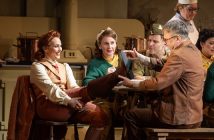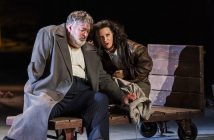Expectations were high on the press night of English National Opera’s new version of Rodgers & Hammerstein’s Carousel, and, produced in partnership with the GradeLinnit company, this was to offer their third creation of an always appealing combination of popular music and big star names in a semi-staged presentation. Despite the enduring popularity of this famed classic, originally a Broadway masterpiece in 1945, the draw on this occasion was the appearance of Alfie Boe and Katherine Jenkins in the leading parts of doomed lovers Billy Bigelow and Julie Jordan. The 1956 film version counterparts were Shirley Jones and Gordon MacRae, both of whom put in performances that were full of energy, pathos and an underlying morality that stayed with audiences so Jenkins, in her first ever acting role, had big shoes to fill.

An innovative opening sequence from director Lonny Price saw the story begin in 1945 and work back to 1930, with the projection of passing skies and images (designed by James Noone), and the use of a revolving stage to conjure up the sense of small-town America, Coney Island and all the fun of the fair. The excitement of the carousel was apparent when the full ensemble, together with twelve principals and twenty-four members of the ENO chorus joined on stage for the cue to ‘Carousel Waltz’. The ENO’s 42-piece orchestra (conducted by David Charles Abell) were in full view of the audience in a specially elevated pit, providing a most rousing piece to portray the energy, wonderment and varied lures of the fair, and setting the scene for the meeting of Billy and Julie.
Billy’s troubled, bad-boy fairground barker and Julie’s innocent and demure demeanour were portrayed well enough by Boe and Jenkins, but neither managed to emanate the charisma or chemistry of Jones and MacRae in the film version, where one could identify and sympathise with the characters while their doomed relationship struggled on. Much more endearing were the enthusiastic performances of Alex Young, in the part of Julie’s friend Carrie, and Gavin Spokes as her beau Mr Snow. Paralleling the romance to Billy and Julie’s, their’s, in contrast, was full of character, humour and optimism and was totally believable; the song ‘When the children are asleep’ beautifully highlighting the perceived ideals of a happy marriage.

The saving grace for Boe and Jenkins was, of course, their magnificent voices; ‘What’s the Use of Wond’rin’ and ‘If I Loved You’ conveying all the passion and conviction so missing from their on-stage presence as a couple. Jenkins came into her own here, for there was not a lot of acting necessary and she certainly looked the part; sad and regretful, whilst capturing the audience’s attention with her impressive vocal range. Boe’s voice was, as always, compelling and thrilling, and the two mis-matched lovers seemed as one at least through the music.
The outcome of their lives, a roundabout of ups and downs, highs and lows, was realised in the finale and a return to 1945; Julie is widowed and their daughter is about to graduate from school. Billy, looking down from heaven, sees what he has left behind and wonders what might have been if he had led a better life before being given a chance to return by The Starkeeper; a quite celestial performance from Nicholas Lyndhurst. The impassioned closing sequence is full of pathos, regret and sadness and is epitomised by the final song ‘You’ll Never Walk Alone’. Always an emotional piece, the full cast and chorus lent it both poignancy and a sense of optimism.
A wonderful production which conveyed so much in terms of song and dance, not least the underlying moral of choosing to take the right path in life, Boe and Jenkins excelled vocally, despite missing the chemistry one would have hoped for. Regardless, you still wouldn’t want to miss this show.
Carousel at the London Coliseum, St Martin’s Lane, until 13th May 2017. For more information and to book tickets please visit the website.




